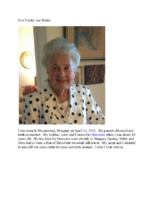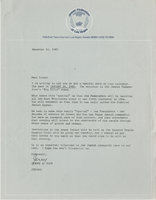Search the Special Collections and Archives Portal
Search Results
Audio clip from interview with Justice Michael Cherry, September 19, 2014
Date
Archival Collection
Description
Part of an interview with Justice Michael Cherry on September 19, 2014. In this interview, Justice Cherry discusses connections with Jewish casino operators. He also talks about losing to, then representing, unions in court proceedings. He was later endorsed by the unions when he ran for office.
Sound
Rona and David Mendelson oral history interview
Identifier
Abstract
Oral history interview with Rona and David Mendelson conducted by Barbara Tabach on April 26, 2016 for the Southern Nevada Jewish Heritage Project. In this interview, Rona and David Mendelson describe moving to Las Vegas, Nevada in 1973 as a married couple and how they became board members of Congregation Ner Tamid, which led them to getting involved with the small and growing Jewish community. They discuss their activities and their current family ties within the Jewish community in Las Vegas. As educators, they also delve into their experiences with the school system in Southern Nevada and the discrimination they faced as Jewish educators and parents.
Archival Collection
Gilbert Shaw oral history interview
Identifier
Abstract
Oral history interview with Gilbert "Gil" Shaw conducted by Barbara Tabach on May 03, 2016 for the Southern Nevada Jewish Heritage Project. Shaw discusses founding group of Congregation Ner Tamid in 1974 that includes himself. He also talks about being a photographer and journalist for the Navy and the Coast Guard during the Korean War and Vietnam War.
Archival Collection

Biographical essay by Eva Weisz Vayda, 2014
Date
Archival Collection
Description
Vayda's essay describes her young-adulthood in Hungary, and being sent to Birkenau camp in 1944, and successive camps afterward. She came to the United States in 1956 with her husband and children.
Text

Transcript of interview with Michael Saltman by Barbara Tabach, December 16, 2014
Date
Archival Collection
Description
In this interview, Michael Saltman recounts his family background, his schooling in Michigan, and living abroad in London and Munich. His travels to Israel in 1968 reinforced his connection to Judaism. Saltman and his wife, Sonja, moved to Las Vegas in 1975 and he began working with Larry Larkin, who eventually became his partner. He discusses several projects he completed with Larkin, including shopping centers and apartment complexes. He talks about the changes in Las Vegas that came about from the availability of financing from legitimate sources, and the population growth of the area. He then talks about his involvement in the local Jewish community with the Jewish Federation, Anti-Defamation League and Congregation Ner Tamid.
In 1942, Michael Saltman, the son of a rugged Canadian entrepreneur and of an educator, was born in Flint, Michigan. Michael spent a fulfilling childhood in Flint, where his family was involved in the Jewish community, even helping start a new temple. However, his life changed dramatically when his father passed away during his teenage years. At his mother's insistence, Michael went to law school after graduating from Michigan State University, and received his Juris doctor from Wayne State University. From Detroit, Michael headed to London to participate in an LL.M. program, though he quickly withdrew and landed a position with a life insurance and investment company in London. Michael soon relocated to the company's Geneva office, where his job included establishing operations in Israel. It was during these trips that he more intensely connected with Judaism and his Jewish identity. Michael left the company to join a former colleague at Shareholders Capital Corporation, where he met his wife Sonja. The couple moved to Munich, where they lived until 1975, until moving to Las Vegas. In Las Vegas, Michael became a successful real estate developer. His projects include apartments, shopping centers and office parks, like Village Apartments, Campus Village Shopping Center and Renaissance Center. He later opened Food 4 Less grocery stores in Nevada, Utah and California, eventually buying the Kansas-based company from Lou Falley. He and his partner later sold the company to Kroger. Michael served on the local Jewish Federation's board of directors, and Sonja is a longtime board member for the Anti-Defamation League's regional office in Las Vegas. In 2003, Michael and Sonja co-founded the Saltman Center for Conflict Resolution within William S. Boyd School of Law. Michael's other efforts to promote peaceful conflict resolution include the production of Streetball Hafla, a movie shot in Israel about Jewish and Palestinian teenagers interacting in basketball camp.
Text
Polly and Jack Weinstein oral history interview
Identifier
Abstract
Oral history interview with Pauline "Polly" and Jack Weinstein conducted by Barbara Tabach on April 12, 2018 for the Southern Nevada Jewish Heritage Project. In this interview, Jack talks about his upbringing in Detroit, Michigan and getting into the jewelry business. He talks about owning a wholesale jewelry business, relocating to Los Angeles, California, and forming a partnership with Tower of Jewels in Las Vegas, Nevada in the late 1950s. Jack recalls becoming the sole proprietor of Tower of Jewels in Las Vegas and describes his clientele. Jack and and his daughter Polly discuss operating up to ten locations at one time, advertising on the Howard Stern radio show, and their more well-known customers. Lastly, Jack and Polly talk about joining Temple Beth Sholom, Polly’s interests in the jewelry industry, and creating her own line of jewelry.
Archival Collection
Kenny Epstein oral history interview
Identifier
Abstract
Oral history interview with Kenny Epstein conducted by Barbara Tabach on May 01, 2015 for the Southern Nevada Jewish Heritage Project. Epstein discusses arriving in Las Vegas, Nevada as a teenager, working in casinos as a dealer, and owning the El Cortez Hotel and Casino.
Archival Collection
Natalie Wolf oral history interview
Identifier
Abstract
Oral history interview with Natalie Wolf conducted by Barbara Tabach on October 22, 2016 for the Southern Nevada Jewish Heritage Project. Wolf shares stories of operating the Greyhound bus station, a three-year ownership of Commercial Deli, and her long career working collections for the casino industry. She discusses working for Tropicana Hotel and Casino, and MGM Properties, including the Mirage Hotel.
Archival Collection

Transcript of interview with Phyllis Friedman by Barbara Tabach, March 2, 2015
Date
Archival Collection
Description
In this interview, Phyllis Friedman reflects upon her extensive work with the ADL in Las Vegas. She discusses the city?s relatively low anti-Semitic activity, and how this allowed the Las Vegas ADL office to focus its efforts more broadly than in other cities. She also touches upon her family history, and how the community of Las Vegas has evolved since first visiting in 1963.
A Chicago native, Phyllis Friedman first came to Las Vegas in 1996 to become the Jewish Federation of Las Vegas? first foundation director. After two years, Friedman moved to year Los Angeles to work for ORT. Itching to get back to Las Vegas, in 2007, Friedman returned to the city to became director of the Nevada regional office of the Anti-Defamation League (ADL). In this position, she worked with schools as well as law enforcement, including the Federal Bureau of Investigation (FBI), teaching about tolerance and justice. She is a recipient of the FBI?s Las Vegas Division Director?s Community Leadership Award as well as the first awardee of Jewish Federation?s Jewish Professional of the Year. Three weeks into retirement, Friedman gave this interview, reflecting upon her extensive work with the ADL in Las Vegas. She discusses the city?s relatively low anti-Semitic activity, and how this allowed the Las Vegas ADL office to focus its efforts more broadly than in other cities. She also touches upon her family history, and how the community of Las Vegas has evolved since first visiting in 1963.
Text

